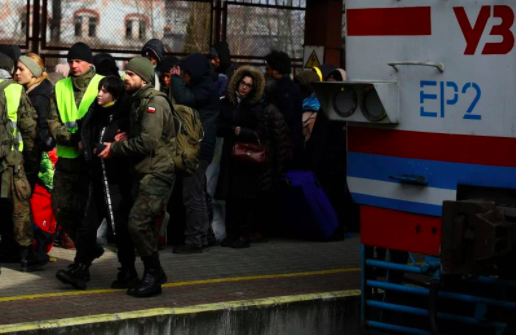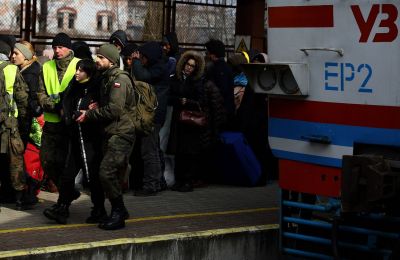
500,000 people have left Ukraine since the start of the Russian invasion, some of whom, pictured here, arrived in Poland by train a train station in Poland. Feb. 28, 2022. (Credit: Kai Pfaffenbach/Reuters)
Chadia al-Hassan has left no stone unturned in her quest to help her two children Ahmad, 20, and Amira, 19, both students at the Ivano-Frankivsk National Medical University in Ukraine, get out of Ukrainian territory, which has been under Russian military attack since Feb. 24.
“There’s nothing we can do. They just have to limit their movement,” a diplomat from the Lebanese Embassy in Kyiv told Hassan abruptly.
“Then they stopped taking my calls,” she told L’Orient-Le Jour. This was when she decided to go knocking on other doors.
At first, she contacted the office of Prime Minister Najib Mikati. No answer. She tried calling the foreign minister, but to no avail.
“I even got into my car. I was driving aimlessly. I just wanted to get to the minister,” Hassan said.
For their part, her two children, along with 10 other Lebanese, decided to head toward the Polish border.
“The Lebanese Embassy in Ukraine did not respond,” Amira al-Hassan, who is currently in Poland, said.
The young students joined the mass of people who have fled the country. In total, they number about 500,000, according to the United Nations.
Ahmad al-Hassan and Amira managed to find a bus to drive them out of the city as quickly as possible. “The price went up. We had to pay more than $400 for 10 people on board,” the young woman told L’Orient-Le Jour via a phone call, with fatigue in her voice.
The bus dropped them off 30 kilometers from the Polish border. They had to walk for seven hours to reach the frontier. This was when the ordeal began for the two young students.
At the first border post, under Ukrainian control, people were pushing and shoving, hurling insults and racist remarks, and sometimes beating each other. The police did not stand idly by, they pulled out the batons. Chaos reigned. Foreign students were divided by nationality.
For two nights, they were forced to sleep on the side of the road as temperatures dropped below zero. Ahmad began to feel frail. Not knowing what to do, Amira called her mother, who urged her to try to talk to the authorities into letting them cross the border.
“I started crying in front of them,” Amira said.
They crossed the second border post, but they faced the same ordeal. Ahmad’s health situation deteriorated after long sleepless nights in the freezing cold. He could barely stand up. Distraught, Amira pulled out all her jackets from her small suitcase, trying to warm him up.
They finally got some sleep from midnight to 4 a.m., before passing the border crossing into Poland, where buses were awaiting to transport them. Since Sunday, Amira and Ahmad have been lodged in a hotel in Krakow, waiting to be evacuated to Lebanon.
“We have been told that the Lebanese government will send a plane,” Amira said.
400 Lebanese allegedly crossed the border
On Sunday, the government in Beirut entrusted the High Relief Committee with repatriating Lebanese citizens from Ukraine.
Gen. Mohammad Kheir, the committee’s secretary general, told L’Orient-Le Jour that he needed 48 hours to find out the number of Lebanese who had managed to cross the border before deciding on the next steps to take.
“If there were many of them, a plane would be chartered to evacuate them. If not, plane tickets would be booked for them,” Kheir explained.
So far, there are 960 people who have registered on an online platform that was set up by the Foreign Ministry, including Syrian and Palestinian nationals, he said.
According to the Ukrainian Embassy in Lebanon, 1,800 Lebanese citizens live in Ukraine. Meanwhile, the Lebanese Embassy in Kyiv estimates the number at 3,700 people.
In Warsaw, the capital of Poland, a center has been opened for Lebanese who have fled Ukraine and wish to be evacuated to Lebanon or who need assistance, according to a press release published by the High Relief Committee on Sunday.
Some 400 Lebanese are said to have crossed the border since the start of the war, but only 70 have been lodged in the center, according to Kheir.
As for the Lebanese who are still stuck in Ukraine, Kheir said it was beyond his power to take action on their behalf.
“We asked them to gather in groups in each city, and we would communicate with one of them,” he said, adding that the Lebanese people “are accustomed to wars, and they know how to dodge security dangers.”
This procedure has already garnered criticism in Beirut. The Amal Movement denounced in a press conference yesterday “the government’s neglect of Lebanese nationals and students abroad, and the distress they face in Ukraine,” adding that the government has been slow in taking the necessary measures to evacuate them.
To reach one of the borders, the Lebanese in Ukraine find themselves left to their own devices. Many who have managed the trip made it to the border at their own expense. Hani* was one of them, but he couldn’t cross.
This Lebanese student who lives in western Ukraine had to pay $300 along with his friend to be able to make it to the Polish border. But the journey was traumatic, and he decided to backtrack.
“They treated us like animals. I ran out of water and provisions. I preferred to escape the discrimination and humiliation,” Hani, in his 20s’, told L’Orient-Le Jour, adding that he would try his luck again through the Romanian border this time.
Meanwhile, Hassan, another young Lebanese student, was able to cross the Romanian border. It was his university that provided a bus to transport students to the border, where he was received by an acquaintance of his brother.
He is now staying for free in a hotel that offers two nights for refugees coming from Ukraine.
'A wait of 20 to 60 hours'
While in Beirut authorities have been slow to act, the Lebanese embassies of the countries bordering Ukraine were very active.
Contacted by L’Orient-Le Jour, Lebanon’s ambassadors in Poland and Romania, Reina Charbel and Rana Mokaddem, are coping with the influx of Lebanese as best as they can.
On the Polish side, some 450 to 500 Lebanese have already crossed the border or are expected to do so soon. In Romania, they are estimated at less than 100 people.
“All nationals will eventually cross the border, but they will have to take into account a wait of 20 to 60 hours,” Charbel said, adding that the Lebanese at the border must make sure to have provisions and something to keep warm.
In the host countries, NGOs and local authorities are transporting refugees to other cities.
In Romania, Mokaddem praised the aid provided by the Lebanese diaspora, which is not standing idly by. Diplomats, for their part, are trying to find hotels to accommodate their compatriots.
But with the economic crisis in Lebanon and budget restrictions, embassies cannot afford to send staff to the border, Mokaddem said.
In Lebanon, civil society groups have also mobilized to help the Lebanese trapped in Ukraine. The Thawra Map, an Instagram account, reported on the conditions of Lebanese citizens at the border, and shared phone numbers or social media accounts that stranded people can get in touch with.
Zeinab Halabi and Lyne Mneimneh, who run the Instagram account “The Lawyard”, have been trying to put the Lebanese nationals stuck in Ukraine in contact with Lebanese living abroad through their platform.
“One person agreed to welcome three people into their home,” Mneimneh said, adding that “once again the Lebanese are left to fend for themselves, which is no surprise.”
*First name has been changed.
This article was originally published in French in L'Orient-Le Jour. Translation by Sahar Ghoussoub.
